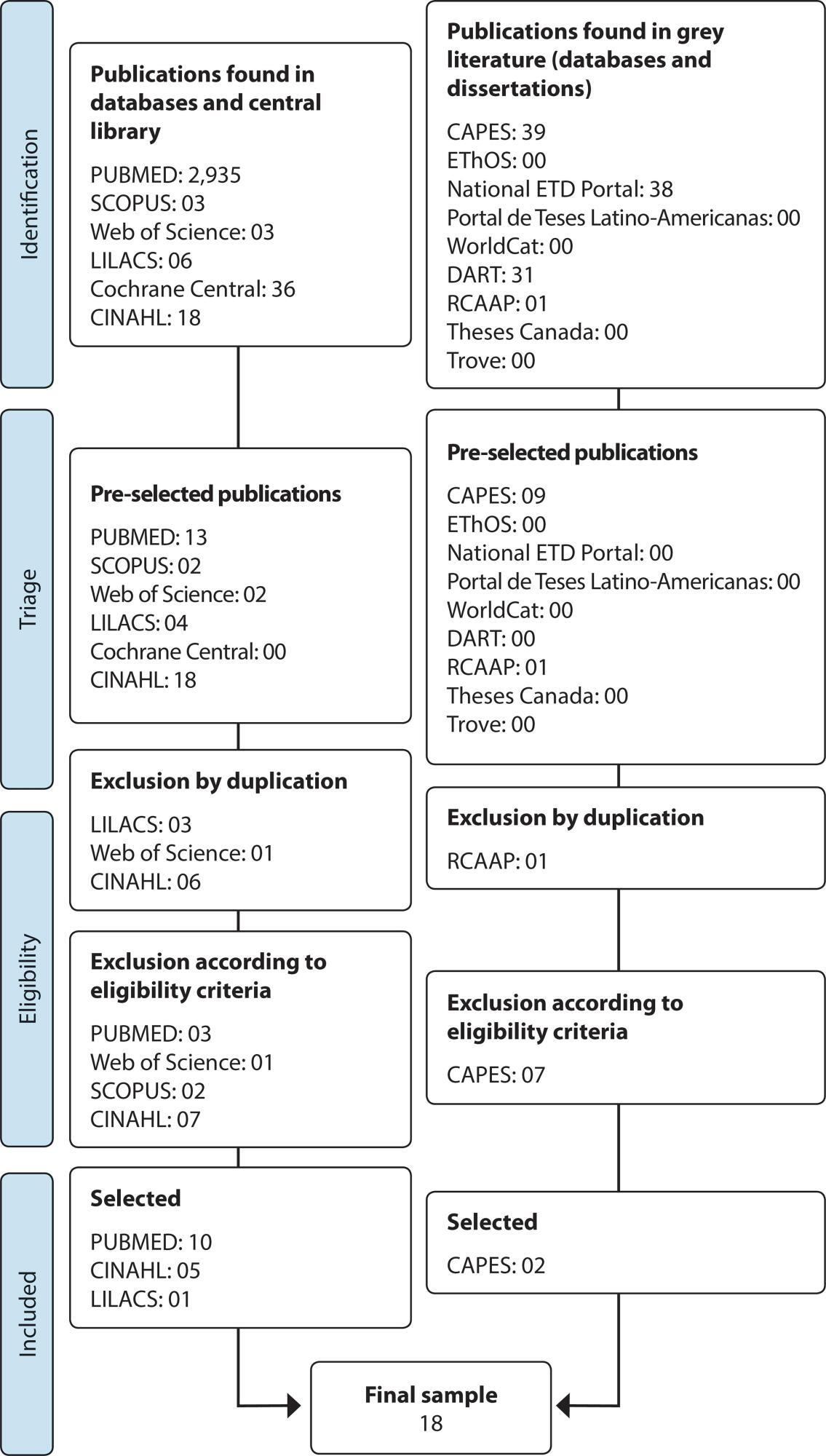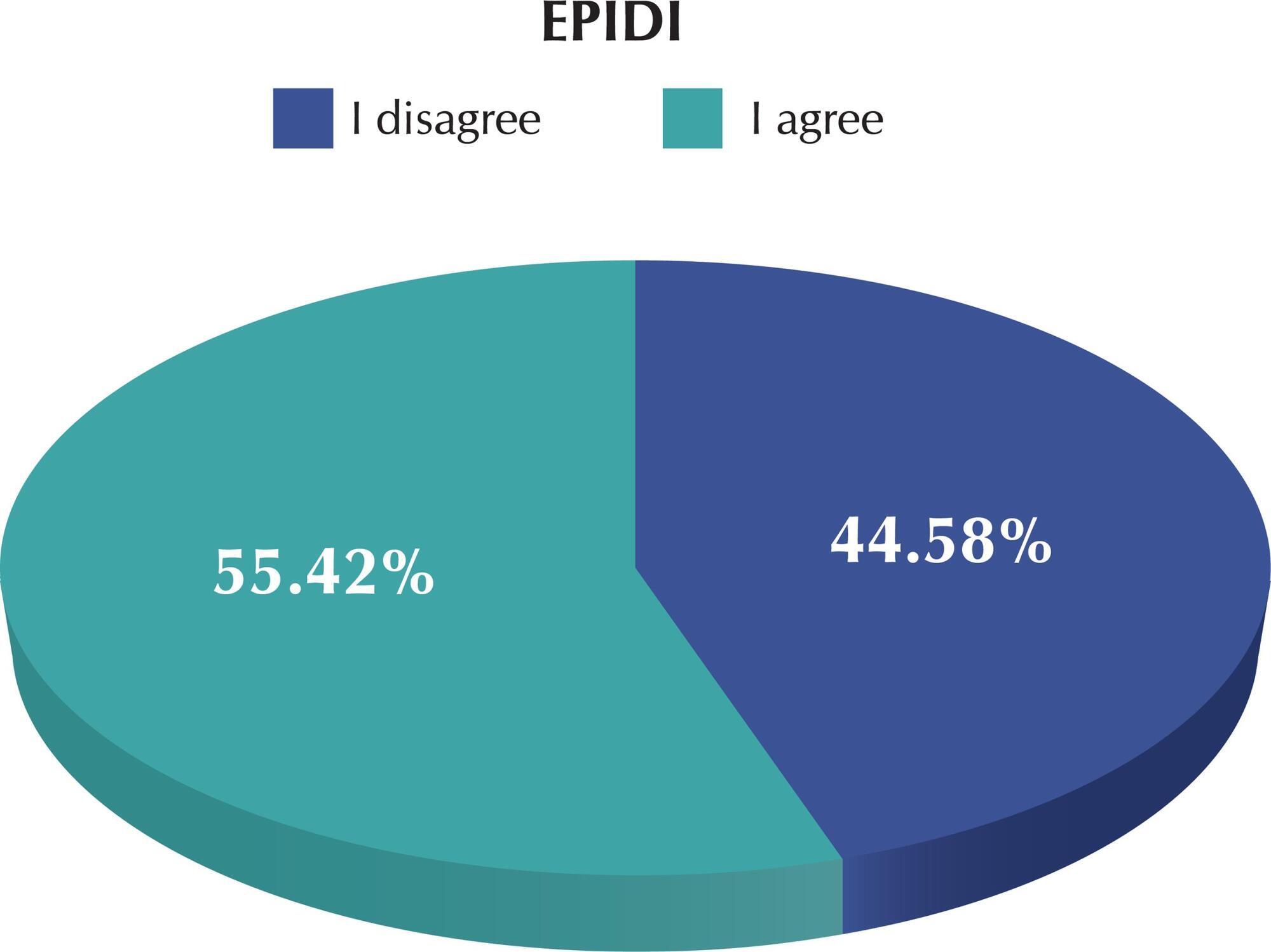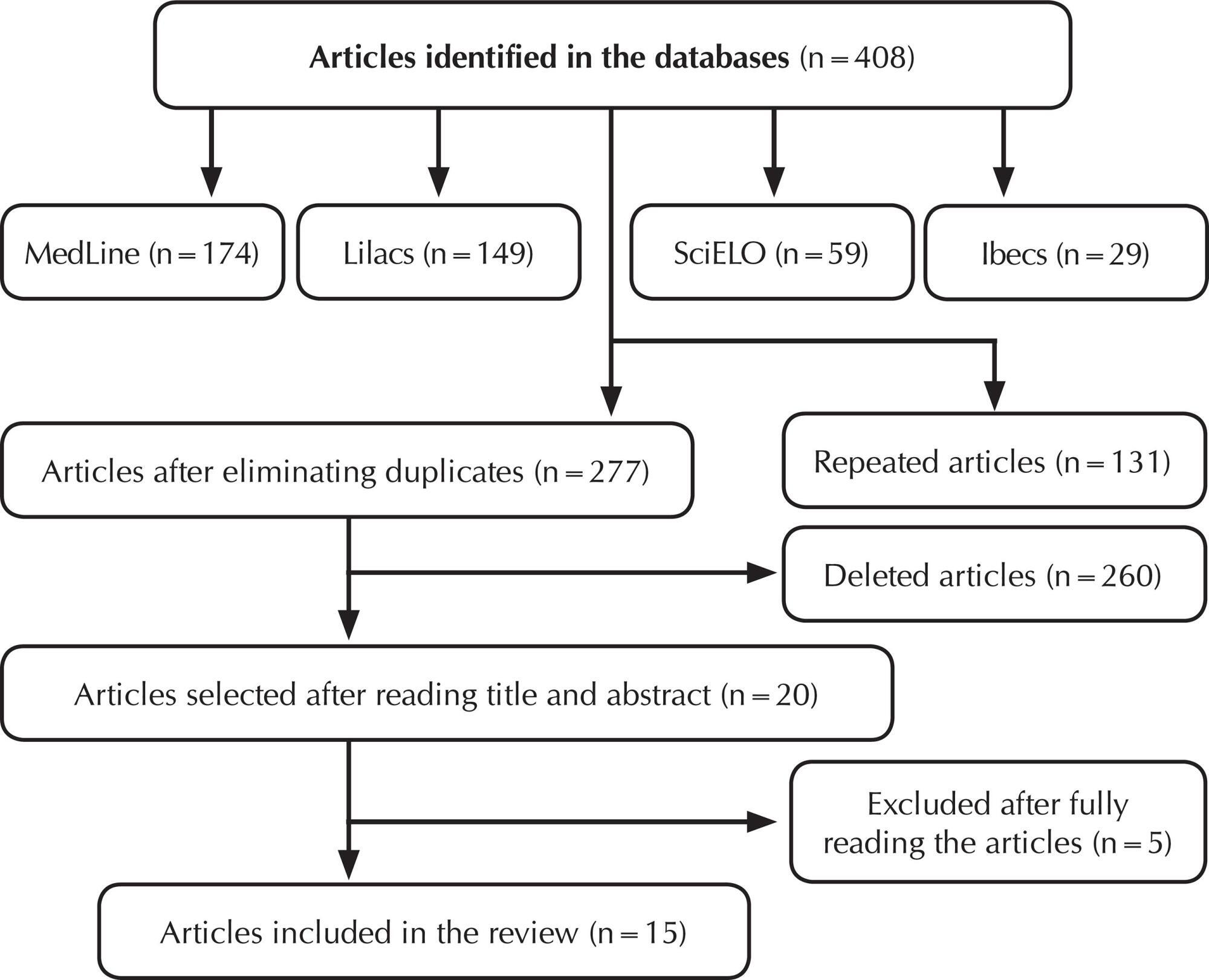-
REVIEW
Assessment of knowledge in oncology about care for transgender people: a scoping review
Revista Brasileira de Enfermagem. 2024;77(Suppl 3):e20230532
11-29-2024
Resumo
REVIEWAssessment of knowledge in oncology about care for transgender people: a scoping review
Revista Brasileira de Enfermagem. 2024;77(Suppl 3):e20230532
11-29-2024DOI 10.1590/0034-7167-2023-0532
Visualizações0ABSTRACT
Objective:
to identify evidence available in the literature on instruments and methodologies used to assess healthcare professionals’ knowledge about cancer care for the transgender population.
Methods:
a scoping review was conducted in seven databases, including studies that answered the question: what is the healthcare professionals’ level of knowledge about cancer care for the transgender population?
Results:
forty-one articles were selected that dealt specifically with healthcare professionals’knowledge in relation to care for the LGBTQIAPN+ population, especially the transgender population. Eighteen studies assessed patients’ perceptions of professionals’knowledge, whereas other studies used their own assessment tools, considering the global context of LGBTQIAPN+ health.
Conclusions:
there is no tested and validated instrument that assesses the knowledge about the transgender population’s oncological health, highlighting the need to construct and validate an instrument focused on this population’s needs.
Palavras-chave: Health Services for Transgender PeopleNeoplasmsOncologyProfessional TrainingTransgender PeopleVer mais
-
ORIGINAL ARTICLE
Functional performance assessment scale for children and adolescents with cancer: cross-cultural study
Revista Brasileira de Enfermagem. 2024;77(2):e20230331
06-14-2024
Resumo
ORIGINAL ARTICLEFunctional performance assessment scale for children and adolescents with cancer: cross-cultural study
Revista Brasileira de Enfermagem. 2024;77(2):e20230331
06-14-2024DOI 10.1590/0034-7167-2023-0331
Visualizações0ABSTRACT
Objectives:
to describe the methodological process of cross-cultural adaptation of the PlayPerformance Scale for Children to Brazilian Portuguese.
Methods:
methodological study of translation and cross-cultural adaptation in six stages: translation, synthesis of translations, back-translation, evaluation by a committee of judges, evaluation by expert nurses, and pretest. The agreement and representativeness of the items were assessed using the content validity index. A minimum value of 80% agreement was considered.
Results:
all stages of the translation and cross-cultural adaptation process were satisfactory. In the evaluation performed by the committee of judges, all items obtained agreement above 80%. Fifteen pediatric nurses conducted the content validation, suggesting necessary modifications for understanding and application. Thirty children and adolescents with cancer were assessed with the scale for the pre-test.
Conclusions:
the scale was cross-culturally adapted to Brazilian Portuguese. The need for psychometric testing in a consistent sample is emphasized.
Palavras-chave: Cross-Cultural ComparisonNursing Methodology ResearchOncologyPediatric NursingPhysical Functional PerformanceVer mais -
REVIEW
Prevention and conduct against the Extravasation of antineoplastic chemotherapy: a scoping review
Revista Brasileira de Enfermagem. 2020;73(4):e20190008
06-17-2020
Resumo
REVIEWPrevention and conduct against the Extravasation of antineoplastic chemotherapy: a scoping review
Revista Brasileira de Enfermagem. 2020;73(4):e20190008
06-17-2020DOI 10.1590/0034-7167-2019-0008
Visualizações0ABSTRACT
Objectives:
to identify and synthesize scientific evidence on prevention and management of extravasation of antineoplastic agents in adult patients by nurses.
Methods:
scoping review, according to Joanna Briggs Institute and PRISMA-ScR. Research was conducted in five electronic databases, Cochrane Library and eight catalogs of theses and dissertations. Data collection occurred from April to July 2018, with no time limit. The extracted data were analyzed and synthesized in a narrative way.
Results:
a total of 3,110 records were retrieved and 18 studies were kept for review. Most publications (66.6%) had a qualitative approach and addressed both aspects, i.e., prevention and management of extravasation of chemotherapy in adult patients.
Conclusions:
the implementation of protocols based on scientific evidence on prevention and management of extravasation of antineoplastic agents is paramount in order to provide patient safety and support to the nursing staff.
Palavras-chave: Antineoplastic AgentsCombined ChemotherapyExtravasation of Therapeutic and Diagnostic MaterialsNursing CareOncologyVer mais
-
ORIGINAL ARTICLE
Caring ability, burden, stress and coping of family caregivers of people in cancer treatment
Revista Brasileira de Enfermagem. 2019;72(6):1541-1546
10-21-2019
Resumo
ORIGINAL ARTICLECaring ability, burden, stress and coping of family caregivers of people in cancer treatment
Revista Brasileira de Enfermagem. 2019;72(6):1541-1546
10-21-2019DOI 10.1590/0034-7167-2018-0605
Visualizações0Ver maisABSTRACT
Objective:
To analyze the association between the caring ability and the burden, stress and coping of family caregivers of people in cancer treatment.
Method:
A cross-sectional study with 132 family caregivers. The following instruments were applied: a characterization instrument, the Caring Ability Inventory, the Zarit Burden Interview, the Perceived Stress Scale, and the Brief COPE. The Spearman Correlation was used with significance ≤5%.
Results:
There were significant and positive correlations between total caring ability and: burden - interpersonal relationship (p=0.03); stress (p=0.02) and maladaptive coping (p=0.00); and inversely proportional correlations with problem-focused coping (p=0.03). The courage had inversely proportional correlation with: self-efficacy (p=0.03), interpersonal relationship (p=0.00), stress (p=0.04) and maladaptive coping (p=0.00). The knowledge had significant and positive correlation with problem-focused coping (p=0.00), adaptive coping (p=0.01), and inverse correlation with stress (p=0.02).
Conclusion:
The level of caring ability correlates with levels of stress and burden, and with the type of coping strategy used by family caregivers.
-
ORIGINAL ARTICLE
Moral Distress Assessment in the Nursing Team of a Hematology-Oncology Sector
Revista Brasileira de Enfermagem. 2019;72(suppl 1):58-65
02-01-2019
Resumo
ORIGINAL ARTICLEMoral Distress Assessment in the Nursing Team of a Hematology-Oncology Sector
Revista Brasileira de Enfermagem. 2019;72(suppl 1):58-65
02-01-2019DOI 10.1590/0034-7167-2017-0408
Visualizações0Ver maisABSTRACT
Objective:
To identify the frequency and intensity of Moral Distress, and to analyze the associations between Moral Distress and sociodemographic and labor characteristics of the nursing team of a Hematology-Oncology.
Method:
A cross-sectional study was carried out with 46 nursing professionals from a Hematology-Oncology sector of a hospital institution in Rio Grande do Sul State, Brazil, through the application of the Moral Distress Scale - Brazilian version. In the data analysis, descriptive statistics and nonparametric association tests were used.
Results:
Mortal Distress intensity of 3.27 (SD= 1.79) and frequency of 1.72 (SD= 1.02) were found in this team. The Moral Distress of greater intensity and frequency were related to the denial of the role of Nursing as a patient's advocate and the disrespect to the patient's autonomy, respectively.
Conclusion:
It is suggested a greater space for discussion among professionals, multiprofessional team and managers, so that adequate conditions of action and communication are provided.
-
RESEARCH
The impact of cancer on healthy siblings
Revista Brasileira de Enfermagem. 2018;71(4):1992-1997
01-01-2018
Resumo
RESEARCHThe impact of cancer on healthy siblings
Revista Brasileira de Enfermagem. 2018;71(4):1992-1997
01-01-2018DOI 10.1590/0034-7167-2016-0449
Visualizações0Ver maisABSTRACT
Objective:
The objective is to identify the variables that influence the impact of cancer on healthy siblings.
Method:
This is a quantitative, descriptive and correlational study with 83 families of children with cancer. We used the “Questionnaire to Assess the Impact of the Children's Cancer on the Family”, “Social Support Satisfaction Scale”, “Graffar Scale” and “Apgar Scale”.
Results:
The results show a relation between social support (X²=5.031, gl=1, p=0.025), expenses (t=-2.009, gl=81, p=0.048), disease impact on family structure (t=-3.210, gl=81, p=0.002) and the impact of the disease on healthy siblings.
Conclusion:
Social support plays an important role in these families, especially in the impact of the disease on healthy siblings. Nurses should identify the support systems that families have available, as well as their family functionality and the implications for healthy siblings.

-
RESEARCH
Perception of cancer patients in palliative care about quality of life
Revista Brasileira de Enfermagem. 2018;71(4):1998-2004
01-01-2018
Resumo
RESEARCHPerception of cancer patients in palliative care about quality of life
Revista Brasileira de Enfermagem. 2018;71(4):1998-2004
01-01-2018DOI 10.1590/0034-7167-2017-0360
Visualizações0Ver maisABSTRACT
Objective:
To understand the perception of cancer patients in palliative care about quality of life and identify propositions for its improvement.
Method:
This is a quantitative research carried out with 96 patients in palliative care, admitted in a public hospital from March 2015 to February 2015. The interviews were transcribed and analyzed by the methodology Discourse of the Collective Subject.
Results:
Quality of life was tied to meanings of health, well-being, happiness and spirituality; however, family and financial problems also had an impact on the perception of the construct. Interventions aimed at the relief of suffering, possibility of return to work and resolution of problems had suggestions for improvement.
Conclusion:
The results indicate that the concept of quality of life is subjective, tied to personal values and influenced by the repercussions of the health-disease process. In addition, they can guide actions based on interdisciplinary assistance aimed at the real needs of these patients.
-
REVISÃO
Odor evaluation scales for odor in neoplastic wounds: an integrative review
Revista Brasileira de Enfermagem. 2018;71(5):2552-2560
01-01-2018
Resumo
REVISÃOOdor evaluation scales for odor in neoplastic wounds: an integrative review
Revista Brasileira de Enfermagem. 2018;71(5):2552-2560
01-01-2018DOI 10.1590/0034-7167-2017-0428
Visualizações0Ver maisABSTRACT
Objective:
Checking for the existence of assessment instruments for odor in neoplastic wounds.
Method:
Integrative review performed in the databases Lilacs, SCiELO, Ibecs and MedLine, including national and international publications.
Results:
15 articles were analyzed, in its majority performed by nurses and being of the revision type. Nine scales were found, of which the majority assesses only the odor intensity. The scale most used to evaluate products and/or bandage covers for neoplastic injuries was the Odor Evaluation Guideline, of qualitative-quantitative nature, that establishes the symptom within four levels; only one of which being validated (Teler scale).
Conclusion:
The results of this study showed that, currently, there is only one scale that is validated for assessing odor in neoplastic wounds, pointing towards the need to develop new instruments that incorporate validated and reliable instruments in clinical practice.




